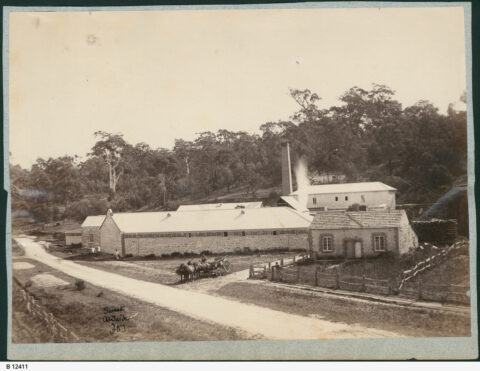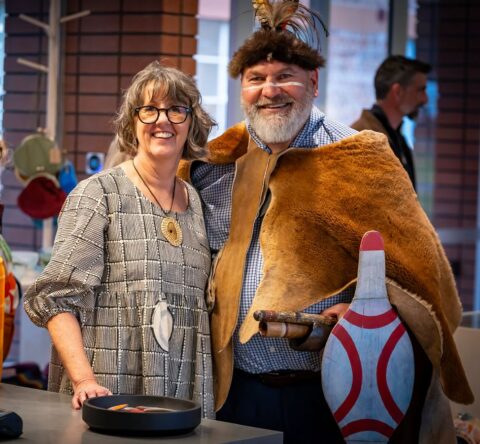Lobethal woollen mill forms the fabric of new arts hub
The history and significance of the former Onkaparinga Woollen Mill in Lobethal has been honoured in the site’s reinvention as a dynamic arts and cultural centre.

At its heart, the transformation of the former Onkaparinga Woollen Mill in Lobethal into a cultural community space represents people power at its best and reflects the locals’ passion for their beloved mill landmark.
The rustic old mill, comprised of multiple buildings, has been redeveloped into Fabrik Arts + Heritage, an architecturally designed arts and cultural hub that celebrates the textile heritage of the mill through arts, creativity, inclusion and community.
Fabrik Arts + Heritage, which opened its doors in September, occupies four of the buildings and includes a gallery, retail store and event area, as well as workshop spaces, artist studios and accommodation for artists-in-residence.
The woollen mill, famous for producing coloured checked blankets, has a rich history in the Adelaide Hills district. It began in 1872 as the Lobethal Tweed Factory before changing its name to the Onkaparinga Woollen Mill Company in 1928. As well as the distinctive blankets, the mill also made army uniforms, car upholstery and airline blankets, and was the major employer in the area until it closed in 1993, ending more than 120 years of manufacturing in the Hills.

“When the mill closed in the early 1990s, the State Government owned the site and transferred that to the council of the day, which has amalgamated into the Adelaide Hills Council, but on the proviso that they use it to replace the jobs that were lost when the mill closed,” says Melinda Rankin, director of Fabrik Arts + Heritage.
“So, the site became an enterprise site for business start-ups and then eventually those businesses became established, and it’s pretty much a food hub around us now. We’ve got wine, cheese, bread, beer and coffee all happening.”
You might like
Today, there are eight established food, wine and engineering businesses on the site, including Lobethal Bierhaus and MIGHTY MIGHTY Coffee Roasters.
Over the years, the mill buildings have been used for cultural purposes, including markets, community museum displays and art exhibitions. Then, in 2015, a local art collective called Hills Art formed to develop arts and cultural activity at the site, and to demonstrate to the council and the community the potential it held as a cultural centre.

“The mill had been just an inherent part of the structure of the town,” Rankin says. “And so, they were concerned that that would be lost [if the site fell into private hands] and they started advocating to council and whenever they could find a spare space, they’d have an exhibition or an artist workshop or artist studio, and they kept track of all the data.
“After that the council did their own community consultation and came up with a proper plan in 2018 to transform a section of the site into an arts and heritage hub.
“There were two things the council was hoping to see: greater connection with the community, so connecting community members through creative practice and through the arts, and then the other side of that was economic development.
“One of the aims is about bringing more visitors to this part of the Adelaide Hills and intending for that to then have a flow-on for all the businesses in the area. And also to look at Fabrik supporting the creative micro-businesses. So, how do I support small businesses, particularly knowing the Adelaide Hills has a high number of artists living in the community?”
The name Fabrik taps into the German roots of the town around the time of colonial settlement and is also a way linking with the textile theme of the venture.
Subscribe for updates
“It also relates to the fabric of the community, so connecting through that,” says Rankin.

Architectural firm Gillett Grieve created the “master plan” and then the job was put out to tender, and awarded to Walter Brooke architects. All aspects had to get State Heritage approval.
“One of the biggest challenges we had in operating was the buildings that were most functional were hidden behind other buildings, and so when people came to the site it was like, ‘Where do we go?’,” Rankin says.
“And so one of the new aspects of the development is a purpose-built, new glass building, we call it The Pavilion… which is now our retail area. So, we’ve got beautiful artisan-made goods, mainly textiles-based or textile-aligned, and it’s a lovely building and we can see out to the whole site.”
The Fabrik Arts + Heritage retail space stocks South Australian art, furnishings, homewares and accessories, including stools and footstools upholstered in blankets by artist Lucy of Plumbers Cottage and glass art works by Bailey Donovan. There is also a large emphasis on textile sustainability, reuse and recycling as a nod to the site’s history as well as its future.
Exhibiting artists include Marilyn Moloney, of Up It Tee Designs, who creates characters, bags and pouches made from fabric that has been removed from book covers, and Sharon Wollaston, of Home Spun by Sharon, who creates her designs from hand-spun fibre, knitting and crochet items.
The Handmade Christmas Market will also be hosted at Fabrik Arts + Heritage on Saturday, December 21.
“This is an example of the success of community-led development,” says Adelaide Hills Council Acting Mayor Melanie Selwood. “Fabrik was born from the advocacy of the local community and has culminated in an arts precinct that will bring vibrancy and stimulate economic activity for the whole region.”
Rankin says opening the Fabrik doors to the public was an “amazingly emotional” experience.
“I think for people to come in, locals, created a kind of excitement for their town and they could see the quality that’s gone into the redevelopment,” she says, “Also, my art-sector colleagues, as well. They were like, this is the most exciting and happening thing in the arts in South Australia at the moment.”
The redevelopment was jointly funded by federal, state and local governments, with $3 million provided through Local Economic Recovery support, under the National Bushfire Recovery Fund, after the 2019 Cudlee Creek fires came close to the mill.
Fabrik Arts + Heritage is open Wednesday to Sunday from 11am to 4pm.

Free to share
This article may be shared online or in print under a Creative Commons licence

